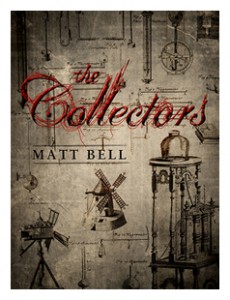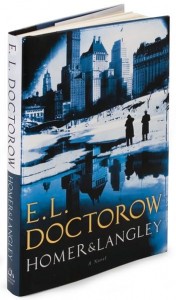 In both of the recent New York Times reviews of E.L. Doctorow’s new novel, Homer & Langley, which is based on the lives of the Collyer brothers, the reviewers go out of their way to point to other artists whose work has been drawn from the lives of these eccentric, hoarding bachelor shut-ins. Michiko Kakutani notes that in addition to Doctorow’s book, their story “reportedly inspired Marcia Davenport’s 1954 novel, My Brother’s Keeper, and Richard Greenberg’s 2002 play, The Dazzle.” Liesl Schillinger adds to this list by mentioning that “A few years ago, Franz Lidz wrote a riveting, fact-filled account of the brothers, Ghosty Men, interwoven with reminiscences of his uncle (also a compulsive hoarder).” And to further underscore their influence as artistic subject matter, she goes on to say that “the peculiar pair have also popped up, by name or reputation, in plays, television shows, and films, as well as in the horror and crime genre—from Steven King’s Salem’s Lot, in 1975, to Linda Fairstein’s Lethal Legacy, published last February.” In short: we are obsessed with the obsessed.
In both of the recent New York Times reviews of E.L. Doctorow’s new novel, Homer & Langley, which is based on the lives of the Collyer brothers, the reviewers go out of their way to point to other artists whose work has been drawn from the lives of these eccentric, hoarding bachelor shut-ins. Michiko Kakutani notes that in addition to Doctorow’s book, their story “reportedly inspired Marcia Davenport’s 1954 novel, My Brother’s Keeper, and Richard Greenberg’s 2002 play, The Dazzle.” Liesl Schillinger adds to this list by mentioning that “A few years ago, Franz Lidz wrote a riveting, fact-filled account of the brothers, Ghosty Men, interwoven with reminiscences of his uncle (also a compulsive hoarder).” And to further underscore their influence as artistic subject matter, she goes on to say that “the peculiar pair have also popped up, by name or reputation, in plays, television shows, and films, as well as in the horror and crime genre—from Steven King’s Salem’s Lot, in 1975, to Linda Fairstein’s Lethal Legacy, published last February.” In short: we are obsessed with the obsessed.
Nowhere is this clearer than in Matt Bell’s The Collectors, which is also based on the lives of the Collyer brothers, and deserves to be added to this canon. His novella, published in book form earlier this summer by Caketrain press, explores the final moments of the lives of Homer and Langley. Though even time itself is bent and distorted here—by blindness, by pain, by the elusiveness of memory. So that we proceed in a tactile fashion, feeling our way through the story just as the blind brother, Homer, maneuvers his way through the maze-like halls of his house.
Yet unlike Homer, we never feel lost here. The narrative is ordered, numbered, and categorized according to its various threads. As such, we experience the pleasurable slowness that accompanies being attuned to the sensory (the texture of old orange peels, the scent of molding newspapers) while still feeling there is momentum and urgency propelling us forward.
 Part of this urgency has to do with a third voice that accompanies those of the brothers: an unnamed writer, who grows increasingly infatuated with and even protective of his subjects. In the opening lines of his first section, he says, “I came in through a history of accumulation, through a trail of documents that led to you, Langley, and to him, Homer.” It is an old trope, of course: the writer as unhealthy obsessive, disappearing into the work, agonizing over the fates of the people in his hands as he narrates to his readers. Yet Bell manages to make this new. Not only because in this case obsession is at the core of the Collyer brothers themselves, but also because of the honesty of the narrative voice. The directness of his language. Coupled together, these qualities are what give the book one of its greatest strengths: compassion.
Part of this urgency has to do with a third voice that accompanies those of the brothers: an unnamed writer, who grows increasingly infatuated with and even protective of his subjects. In the opening lines of his first section, he says, “I came in through a history of accumulation, through a trail of documents that led to you, Langley, and to him, Homer.” It is an old trope, of course: the writer as unhealthy obsessive, disappearing into the work, agonizing over the fates of the people in his hands as he narrates to his readers. Yet Bell manages to make this new. Not only because in this case obsession is at the core of the Collyer brothers themselves, but also because of the honesty of the narrative voice. The directness of his language. Coupled together, these qualities are what give the book one of its greatest strengths: compassion.
Because, ultimately, The Collectors is as much a confession as an investigation, action and apologia braided together. For despite our greatest attempts at authenticity as fiction writers, we cannot help—in fact, we must—alter the histories and pasts we seek to animate, which is a kind of ruin. Even the most rigorous attempts to dignify and understand the lives of our subjects will eventually distort them, if for no other reason than they are a means to an end: the writing itself. And this side effect of the process is something that Bell’s narrator, the unnamed writer, is keenly aware of. Near the end of the book he even says, “I want them to see you as I saw you when I first came to this place, before I started telling your story to my own ends.”
But at the same time he understands, as we do, that this is ok. That preservation is not the only goal of writing. That facts alone can’t capture the essence of what it feels like to be alive. Yet by taking the time to legitimately recognize the tension that exists between what the art needs and what the life that’s been lived deserves, Bell manages to honestly grapple with the dilemma we all face, rather than simply pulling out the old cliché about “emotional truth” superseding “factual truth” that we often use in our profession to justify our actions when we sit down at the desk.
In the end, though, the reason that The Collectors deserves to be read—and the reason it also deserves a place alongside these other texts that have explored the lives of Homer and Langley—is not simply because it illuminates the pleasures and dangers of being a writer, but also because it’s a good story. This is what matters most, right? It’s certainly what’s kept us coming back to the Collyer brothers and their sagging brownstone for the last sixty years.
Further Resources

– In addition to his work as a writer, Matt Bell is the editor of The Collagist, an online literary journal. He was also recently named the new editor of Dzanc’s Best of the Web anthology series.
– The Collectors was the runner-up in Caketrain’s annual chapbook contest, judged by Brian Evenson. The winning title, All the Day’s Sad Stories, was written by Tina May Hall. Brian Evenson says this of the novella:
In precise, beautifully-rendered language, Tina May Hall subtly sketches the ups and downs of a woman trying to get pregnant and the way her life is impacted by the flutter of the world and the rhythm of life: internet poker, minor infidelity, fights over mail-order seedlings, hurricanes, and a series of mysterious xs appearing on her house.
– The Collectors is currently sold out, but you can download a digital copy from Caketrain for free (yes, free!) here.
– The next deadline for Caketrain’s annual chapbook contest is October 1. This year the genre is poetry, and the manuscripts will be judged by Michael Burkard. The winner of the competition will receive a $250 cash prize and 25 copies of their chapbook, which will be published in a limited run in 2010. Here is a link to contest information.





